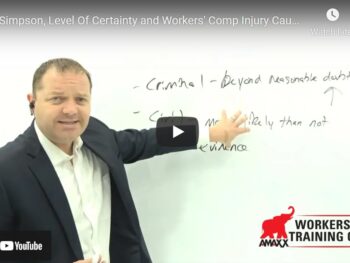Since WWII, work comp has had growing complexity of interactions with other laws and plans offering medical benefits. For the most part, the interactions were behind the scenes and left to insurance professionals. All of this seems to have changed.
Major Law Changes Have Significant Impact On Employers
In 1982, a major change in the comp laws occurred but was little noticed for over five years. Medicare was given the right to file a state workers compensation claim, on its own behalf, if it felt it was paying medical for what should be a comp claim. As computer databases on all state workers comp claims grew, the law suddenly had very large, sharp teeth.
But now, the Affordable Care provisions are also added. Already, it can be predicted that many employees would rather “protect” themselves by filing comp claims and put as much of their medical as possible under a state law which seems far friendlier than federal benefits.
But how does this affect employers?
Federal Computers Detect Merest Hint of Workers Compensation
Consider the powerful federal computers used to oversee health benefits. They are already in place to detect the merest hint of a workers compensation claim which could transfer liability from the federal government to a private employer. They have, in fact, the largest medical cost control program in history already in place.
What happens if that computer notices that an employee who had three minor back claims over a period of years is suddenly requiring back surgery? It is entirely predictable that a claim for medical reimbursement and transfer of future liability will be made. But how and where will this be resolved? Maybe at the state comp board? Or maybe in a federal agency or court.
However it will be handled, it will be neither quick, cheap or largely favorable to employers. And what will it do to experience modifiers?
The problems only begin there. The last employer, or carrier, will seek to apportion with other prior claims. And New York has recently abolished Sect. 25-a, a part of the comp law that paid old reopened claims out of a special fund, instead of placing it on the former employer and carrier.
Today’s Technology Can Work Against Employers
In prior decades, before computers and federal involvement, claim material was paper and, if old, was stored in warehouses. Most claims people preferred to forget the past rather than dig it up with great effort and expense. But computers don’t treat information in such a manner. Past claims will never be forgotten. This is particularly true if a large powerful party gains an advantage from a near perfect memory.
Few people not involved in day to day comp operations are aware that the sheer bulk of records compelled a “close is good enough” approach. The comp systems operated, ironically, because most people, workers included, were not determined to obtain the last nickle on every claim, especially on smaller claims.
But a computer has no shame and never tires. The rules of engagement are going to be fierce.
Author: Attorney Theodore Ronca is a practicing lawyer from Aquebogue, NY. He is a frequent writer and speaker, and has represented employers in the areas of workers’ compensation, Social Security disability, employee disability plans and subrogation for over 30 years. Attorney Ronca can be reached at 631-722-2100. medsearch7@optonline.net
Editor Michael B. Stack, CPA, Director of Operations, Amaxx Risk Solutions, Inc. is an expert in employer communication systems and part of the Amaxx team helping companies reduce their workers compensation costs by 20% to 50%. He is a writer, speaker, and website publisher. www.reduceyourworkerscomp.com. Contact: mstack@reduceyourworkerscomp.com.
©2013 Amaxx Risk Solutions, Inc. All rights reserved under International Copyright Law.






















